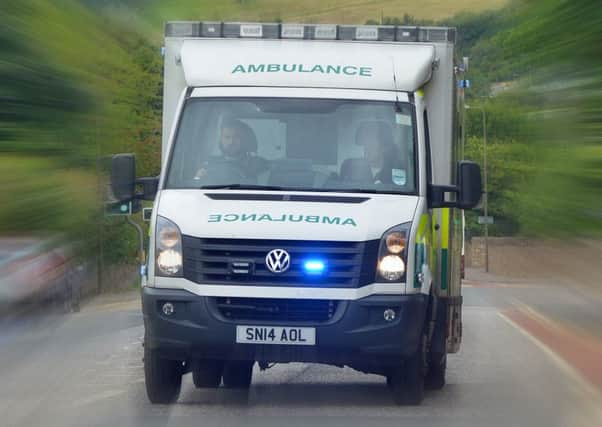Scots ambulances miss life-threatening calls target


.
Figures published as part of the Scottish Ambulance Service’s annual review yesterday revealed that only 72.2 per cent of the most urgent calls were dealt with in the eight-minute time limit in 2014-15, down from 73.9 per cent the previous year.
Paramedics also missed a lesser target to attend 95 per cent of serious, but not life-threatening calls, within 19 minutes.
Advertisement
Hide AdAdvertisement
Hide AdThe news came just weeks after an investigation was launched into the death of a man who is alleged to have waited more than 45 minutes for an ambulance.
Stretched paramedics are increasingly tied up with bizarre requests, such as helping a drunk man who had wet himself, one insider told The Scotsman.
The ambulance service admitted it had faced a “challenging” 12 months due to sustained growth in demand coupled with the financial constraints of achieving efficiency savings of £8.7 million.
Complaints have soared by 11.5 per cent, up to 530 for the year.
However, ambulance staff surpassed a separate target to answer 90 per cent of 999 calls within 10 seconds and the average response time for life-threatening calls was 6.6 minutes, compared to 9.5 minutes a decade ago.
There has also been a 30 per cent increase in lives saved among people suffering an out-of-hospital cardiac arrest.
David Garbutt, chairman of the Scottish Ambulance Service, said: “Despite an exceptionally busy year for our frontline teams, the service is saving more lives than ever before.
“In the last ten years demand has increased by 55 per cent and last year emergency ambulances responded to almost 750,000 incidents.
Advertisement
Hide AdAdvertisement
Hide Ad“Around 20 per cent of these cases are potentially life-threatening and more than a third are requests from GPs, referrals from 111, hospital transfers, community alarms and other emergency services. While the response time is an important aspect of pre-hospital care, the clinical expertise of ambulance teams is key to maintaining good patient outcomes.”
The figures were described as “alarming” by Scottish Conservative chief whip John Lamont, who said a lack of support from Holyrood was placing immense strain on staff.
He said: “We’ve known for some time that the Scottish Government must do better when it comes to the ambulance service.
“It’s clear to see why the service is in trouble – it’s all down to financial pressures caused by the Scottish Government. This puts immense strain on the staff who are left to get on with what is a tough and thankless job.
“It also adds up to a poor quality service for patients, some of whose lives depend on ambulances.”
Liberal Democrat health spokesman Jim Hume MSP called for a probe. He said: “The response time of the ambulance service could make a difference between life or death so we need assurances this front-line service has the resource it needs.”
A paramedic, who did not wish to be named, said there were not enough resources to cope with the rising numbers of calls. He said: “We are getting tied up with things like helping the police with drunks and spending hours sitting with people who aren’t perhaps the most urgent cases.
“People are just phoning up all the time and repeat callers often know what to say to get their call marked as urgent. It’s getting absolutely ridiculous.”